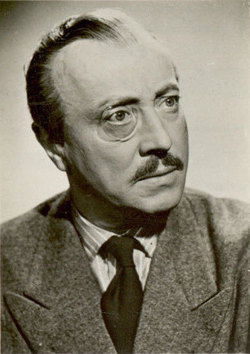

Queer Places:
Friedhof Schladen
Schladen, Landkreis Wolfenbüttel, Lower Saxony (Niedersachsen), Germany
 Hubert
"Hubsi" von Meyerinck (23 August 1896 – 13 May 1971) was a German film actor.
He appeared in more than 280 films between 1921 and 1970.[1]
Hubert
"Hubsi" von Meyerinck (23 August 1896 – 13 May 1971) was a German film actor.
He appeared in more than 280 films between 1921 and 1970.[1]
Meyerinck was born in Potsdam, Brandenburg, the son of Friedrich von Meyerinck (1858–1928), Hauptmann (Captain) in the Prussian Army. He grew up at his family's estates in the Province of Posen and attended the gymnasium secondary school in Godeberg. Having passed his Abitur exams, he was called up for military service as a cadet in World War I, but soon was dismissed due to a pulmonary disease.
In 1917 he gave his debut as a theatre actor at the Schauspielhaus in Berlin and from 1918 to 1920 continued his career at the Hamburg Kammerspiele. Back in Berlin he performed in avant-garde plays by Carl Sternheim, as well as in several revue entertainments and kabarett venues. Later he returned to classical theatre with engagements at the Deutsches Theater and the Lessing Theater, performing as The Imaginary Invalid, Mephistopheles, but also as Captain of Köpenick or as Meckie Messer in Brecht's Threepenny Opera.
From 1920 onwards, Meyerinck starred as a silent film actor, whereby he developed a distinctive appearance with his high forehead and moustache, often emphasizing his hypnotic expression by sporting a monocle. He was able to continue his career in the sound film era by his unmistakable rasping voice, which perfectly added to his physiognomy, having a standing order for scoundrels and charlatan roles.
Commonly identified as a homosexual he ran the risk to be imprisoned by the Nazi authorities like his friend Kurt von Ruffin, nevertheless, he performed in numerous entertainment films of Nazi cinema. After World War II, Meyerinck remained one of the busiest film actors in West German cinema. He starred as quirky official, devious noble or impostor in numerous film comedies, often together with Peter Alexander and young Ilja Richter but also in several Edgar Wallace films of the 1960s. The magazine Der Spiegel called Meyernick's role in numerous films a "comical Erich von Stroheim, who parodied Prussianism and made it ridiculous".[2] He also continued as a theatre actor, from 1966 in the ensemble of the Thalia Theater in Hamburg.
Hubert von Meyernick made one of his few Hollywood film appearances in Billy Wilder's film satire One, Two, Three (1961), portraying in a memorable supporting role the penniless aristocrat Count Waldemar von und zu Droste-Schattenburg, who adopts Horst Buchholz for financial reasons. Meyernicks skills in English were rather bad, so he was dubbed by German-American actor Sig Ruman. The Jewish Billy Wilder spoke about Meyernick in a 1997 interview with Der Spiegel: "I remember a gay actor, we called him Hubsi, Hubert von Meyernick. He never vaunted himself for that, but during the Kristallnacht he went along the Kurfürstendamm and called: If somebody among you is Jewish, follow me! He cached the people in his apartment. Yes, there were decent people, whose words you could believe, that it was hard to do resistance during that time. People like Meyernick were marvelous, wonderful."[3]
Meyerinck died from heart failure in Hamburg. He is buried in the Schladen cemetery near Braunschweig.
My published books: